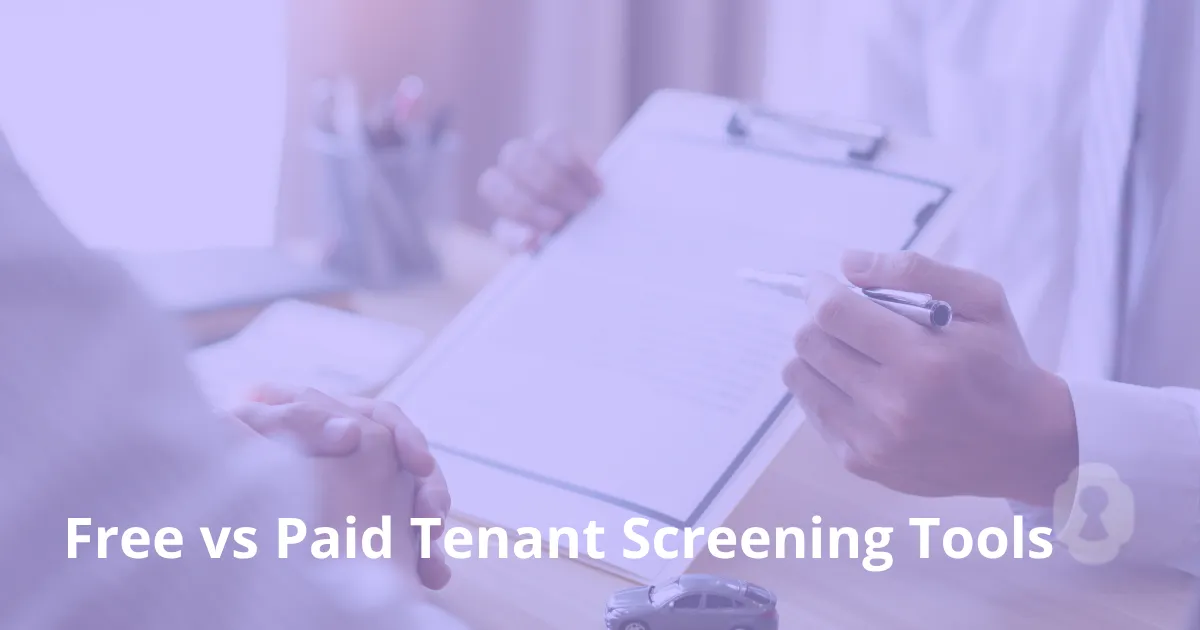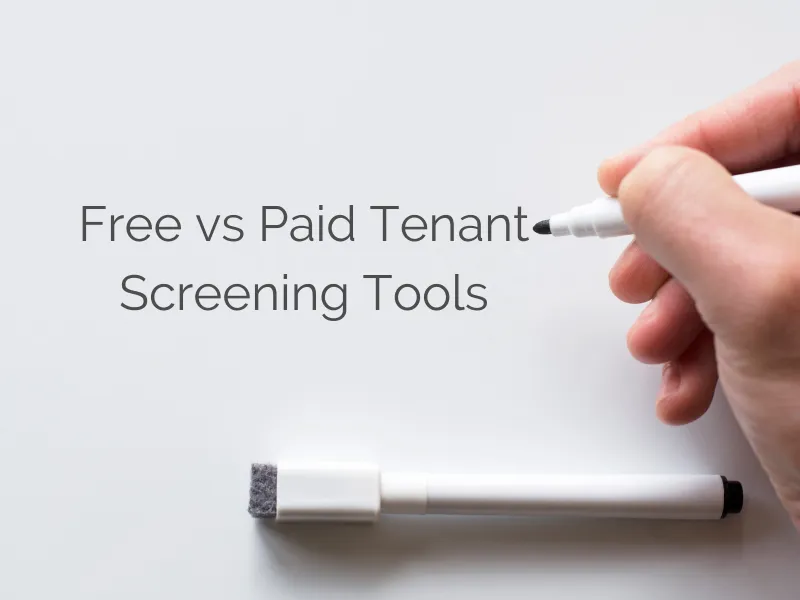
Did you know a bad tenant can cost a landlord thousands?
Effective tenant screening is key to avoid these costs. As a landlord, you need a tenant screening service that works well and is trustworthy.
.webp)
Choosing between free and paid tenant screening services can be tough. Free services might seem good, but they might not check everything you need. Paid services give you detailed reports but cost more. Knowing the differences is important for making the right choice.
"The true value of tenant screening isn't found in simply filtering out bad candidates—it's about creating sustainable matches between properties and people. When we reframe screening from a defensive measure to a compatibility assessment, we transform the entire rental relationship. The most successful property managers understand that comprehensive screening is an investment in reduced turnover, consistent cash flow, and community stability. In today's rental market, the difference between basic verification and holistic applicant evaluation can mean thousands in saved costs and countless hours of avoided stress for both owners and residents alike."
Taylor Wilson, CEO of Rent with Clara
Effective tenant screening is key to a profitable and stress-free rental experience. It helps landlords avoid property damage and unpaid rent by carefully checking potential tenants.
Tenant screening is crucial in property management. It helps landlords choose the right tenants. A good tenant screening process finds reliable tenants, protecting the landlord's investment.
Using a top best tenant screening service gives landlords deep insights. They can see a tenant's credit history, eviction records, and criminal background. This info is vital for deciding if a tenant is a good fit.
A screening report has several important parts:
By looking at these parts, landlords can understand a tenant's reliability. Experts say, "A detailed tenant screening is vital for less risk and a better landlord-tenant relationship."
"A good tenant is not just someone who pays on time, but also someone who respects the property and adheres to the lease agreement."
Choosing a trusted best tenant screening service helps landlords make smart choices. It leads to better tenants and fewer risks.

Finding the best tenants is key. Knowing the difference between free and paid screening tools is crucial. These services are vital for property managers, helping to find trustworthy renters.
Free tools offer basic checks like credit scores and criminal history. But, they often have limits. This can mean outdated info or not enough details.
These might work for small landlords or those with a few properties. But, bigger portfolios need more detailed checks.
Paid services give a deeper look, including:
These features help landlords make better choices. They lower the chance of bad tenants. Plus, they often work with property management software, making screening easier.
Free and paid services differ in accuracy and reliability. Paid services usually have fresher, more detailed info. This means fewer false positives or negatives.
Key differences include:
Landlords must think about the cost and value of screening services. Free options might seem good, but they can lead to costly mistakes. Incomplete or wrong info can harm your business.
Factors to consider when assessing value:
By looking at these points, landlords can choose wisely. They can find a balance between cost and the need for reliable tenant checks.
Many landlords are looking for ways to save money. They are turning to free tenant screening services to check out potential tenants.
There are several free services that landlords find useful. Stessa and Apartments.com offer basic features that help in screening tenants.
Free services have their downsides.
They might not provide:
Landlords need to know these limitations when using free services.
Free tenant screening is best for certain landlords.
They include:
Landlords looking for more than basic info find paid tenant screening solutions valuable. These services give a detailed look at a potential tenant's background. This helps landlords make better choices about who to rent to.
Paid tenant screening services like RentPrep and SmartMove are popular among landlords. They offer advanced features that benefit landlords.
These include:
These features are key when screening tenants for a rental property. They give a full view of the applicant's reliability and financial stability.
Paid tenant screening services offer advanced features that improve the rental application process.
Some benefits include:
Many paid tenant screening services now integrate with popular property management software. This integration makes it easier to screen tenants. Landlords can access screening reports directly within their management systems.
For example, RentPrep integrates with AppFolio and Zego. This makes managing rental applications and tenant screening simpler.
Understanding the cost of paid tenant screening services is key for landlords. Costs vary based on the service provider, screening depth, and report number.
When looking at costs, landlords should think about the value of the info. How it helps pick reliable potential tenants is important.
Choosing the right tenant screening service is crucial for landlords. It helps reduce risks and increase profits. Free and paid services have different impacts on your business and tenants.
The type of rental property you manage significantly impacts which tenant screening options work best for your situation. Single-family homes typically require standard resident screening that focuses on credit history and income verification, while multi-unit properties benefit from services that can process multiple applications simultaneously.
Landlords and tenants in luxury markets often need enhanced financial verification, including bank statements and asset documentation, which not all basic services provide.
Student housing presents unique challenges where the prospective tenant may have limited credit history, requiring screening criteria that emphasizes co-signer evaluation and parental income verification.
Commercial properties need specialized services that can analyze business credit reports and corporate financial statements, which differs substantially from residential tenant report requirements.
Several factors influence your choice of tenant screening service. These include the size of your property, your risk level, and your budget. Paid services often provide more detailed checks like credit and criminal history. These are key for making good tenant choices.
The size of your property portfolio affects your screening choice. For small portfolios, free or basic paid services might be enough. But, larger portfolios need stronger screening tools to handle more tenants.
Landlords must weigh the cost of screening against the risk of bad tenants. Paid services can be a better investment by lowering the risk of costly evictions and damage.
"A thorough tenant screening process is an investment in your property's future. It's not just about finding someone to pay rent; it's about finding a reliable, respectful tenant."
Paid screening services can offer a high return on investment. They help identify risks early, avoiding costly problems later. For example, a $50 screening might prevent an eviction that costs thousands.
In conclusion, picking the right tenant screening service is key for your rental business. It's about understanding the value of paid services.
Understanding who will pay for the screening is crucial for budgeting and legal compliance. While many services allow screening fees to be paid for by the tenant, landlords must ensure this practice complies with local regulations, as some jurisdictions limit or prohibit tenant-paid screening fees.
The decision of whether costs are covered by the tenant or landlord often depends on the screening service's capabilities and local market practices.
When fees are paid for by the tenant, landlords should use services that provide clear documentation of charges and refund policies for denied applications. Some services available offer tiered pricing where basic screening is landlord-paid while additional verification services can be tenant-paid, providing flexibility in cost management while maintaining thorough evaluation standards.
When evaluating screening services available, landlords and property managers need to establish clear criteria before making a decision. Start by identifying whether you need a basic tenant screening service that includes credit checks and criminal history, or if your properties require more extensive tenant screening with employment verification and rental references.
The key is to tailor the screening process to your specific property type and tenant demographic, as luxury rentals often need different verification levels than standard apartments.
Landlords who want to choose the best one should test potential services with sample reports before committing to long-term contracts. Many platforms offer a tenant screening trial or discounted first report, allowing you to evaluate report quality and turnaround times.
Additionally, consider whether the property management platform integrates seamlessly with your existing workflow, as switching between multiple systems can create inefficiencies in application and screening processes.
As a landlord, it's vital to follow fair housing laws and the Fair Credit Reporting Act (FCRA) when screening tenants. The rules around tenant screening are complex. Breaking them can lead to big legal and financial problems.
Fair housing laws ban discrimination based on race, color, and more. Landlords must make sure their screening is fair for everyone. This means no biased ads or unfair criteria.
Key aspects to consider:
The Fair Credit Reporting Act (FCRA) controls how credit info is used. For landlords, this means getting consent before checks, telling applicants why they were denied, and checking data accuracy.
Best practices include:
Paid tenant screening services offer tools and advice to follow laws. They help with fair housing and FCRA rules. This lowers the chance of breaking the law.
For example, a paid service might give a guide to tenant screening laws. This helps landlords know their legal duties.
Keeping detailed records is key to showing you follow the law. Landlords should document the screening process, including applications and credit reports.
By following these tips and using paid services, landlords can lower their legal risks. This ensures they follow all laws and regulations.
Effective tenant communication throughout the screening process helps build positive relationships while ensuring compliance with legal requirements. When a service provides a tenant screening report, landlords must communicate results professionally, especially when delivering adverse action notices.
Clear upfront communication about screening criteria and timelines helps set appropriate expectations and reduces applicant anxiety during the evaluation period.
The best services facilitate smooth communication by providing applicant portals where prospective tenants can track their application status and upload required documents. This transparency helps landlords and tenants maintain positive relationships even when applications are ultimately denied, which can be valuable for future referrals and reputation management.
Effective tenant background checks are key for landlords to find trustworthy tenants. They help protect their rental properties. By knowing the differences between free and paid services, landlords can make smart choices.
Paid services like RentPrep, TurboTenant, and AppFolio give detailed reports. These include credit scores, criminal records, and eviction history. These features help landlords pick the best tenant for their properties. Free services might seem good, but they often have limits and risks.
When picking a tenant screening tool, think about your property size, cost, and risk level. By weighing these, landlords can find a service that fits their needs. A thorough background check is vital for a successful rental business.